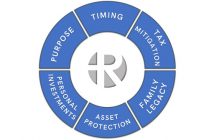This topic is now an important one in our family as we welcomed our first grandchild last month. While tending to the hourly needs of your new bundle of joy takes a lot of energy, here are some issues that should be addressed both before and after your bundle of joy arrives.
Budgeting for baby
Develop a new spending plan
The birth of a child is an opportunity for you to set up a new budget or review an existing one. You’ll have to consider the impact that your child will have on your living expenses as well as account for any shift in income that might occur if you decide to quit your job. You’ll also need to save more money to ensure that your family has money to meet its future needs.
Expenses that typically increase when you have a baby
• Your grocery bill: Diapers and formula (you may use some even if you’re breast-feeding) are very expensive. Later, when your baby turns to solid food, you’ll have to figure in the cost of baby food.
• Your housing costs: If you don’t already live in a house or large apartment, you may find yourself moving once your baby gets old enough to take up a lot of space with toys and equipment.
• Medical expenses: You’ll probably pay a co-payment for each of these trips unless your health insurance plan covers 100 percent of well-baby care. Your health insurance premium will likely dramatically increase as well, unless you already had family coverage for you and your spouse.
• Cost of child care: Whether you look for full-time daycare or hire an occasional baby-sitter, you need to plan for the impact this will have on your budget.
Initial expenses
The initial outlay for your baby can be quite high. You’ll have to equip your home with baby furniture, a stroller, a high chair, an infant seat, a car seat, bedding and clothing, among other items. You could spend well over $1,000 equipping your home with just the basics, and many new parents spend a lot more.
However, when you’re shopping for the baby you’re expecting, try to separate emotion from need. Of course, you want your baby to have the best, but you don’t really need the best in most cases. Your baby won’t look any cuter in an expensive crib, and many parents can tell stories about the top-of-the-line stroller they purchased and then found was too heavy to push easily. The best way to proceed is to ask other parents for recommendations, then shop around. Usually, you don’t have to sacrifice quality and safety to save money. If you start shopping far enough ahead, you can find good deals in discount stores, department stores and superstores. You can also look for items in thrift stores, consignment shops and yard sales, although finding clean secondhand items in good condition can be a challenge. Ask friends and relatives, too, if you can borrow baby items that they’re not currently using. If your friends are throwing you a shower, ask for items you need.
Costs of daycare
The cost of daycare will depend on where you live, how many children you have in daycare, how old your children are and what type of childcare you choose.
Saving for education
It’s wise to begin saving for your child’s education as early as possible. There are several ways to do this. You can begin by depositing a certain amount every month into a savings or money market account, contribute to a college savings account, purchase Series EE bonds (may be called Patriot bonds) or take advantage of a wide variety of other investment vehicles.
Saving for emergencies
If you don’t have an emergency fund, now is the time to set one up. If your child gets sick, your car breaks down, you need to move unexpectedly or you lose your job, you can dip into your emergency account. An emergency account should normally contain an amount that equals three to six months’ worth of living expenses.
Estate planning issues
Estate planning is a subject many parents would like to avoid. After all, you’re celebrating new life, and it’s sad to think that you may not be around to raise your child. However, it’s crucial to the welfare of your child that you leave behind instructions that clarify your wishes in the unlikely event that you die before your child grows up. If you don’t currently have a will, now is the time for you (and your partner, if any) to draw one up. If you do have a will, you’ll need to review it. You’ll want to nominate a guardian for your child and decide how you want your assets distributed. You may also consider setting up a trust to protect your child’s interests after your death, as well as review your beneficiary designations.
Wills
Each parent should have a will to ensure smooth distribution of his or her estate. After your child is born, you should review your will (or draw up a will if you don’t already have one) to make sure that your assets are distributed as you would like, to nominate a guardian for your child and to choose an executor for your estate.
Nominating a guardian
Choosing a guardian for your child is very important. If you die without naming a guardian for your child, it will be up to the court to do it for you, and the person whom the judge names may not be the person you would have chosen to look out for your child. When choosing a guardian, look for someone who will look out for the best interests of your child, preferably someone who has the time and energy to meet the demands of raising a child. Make sure that you ask a potential guardian whether he or she would like to serve as your child’s guardian. Often someone you think is the perfect choice really doesn’t want the responsibility. For this reason, you should also nominate a contingent guardian.
Periodically rethink your choice of guardian. As your children grow older, you can ask them whom they would like to live with in the event you die. Although this can be a scary subject for children, it’s important to raise the issue with them. In addition, once your children are old enough, tell them who their guardian will be in the event you die.
Insurance issues
Before your child is born, review your insurance coverage to make sure that you and your family are adequately protected. If you or your spouse is going to quit your job(s), you may cut off your life, disability or health insurance benefits from that job, and you’ll need to buy more coverage.
Life insurance
Having a child will increase your need for life insurance coverage. Many experts recommend that you have life insurance equal to five times your annual salary.
Disability insurance
Before you had a child, you may not have worried about becoming disabled. Now that you’re planning to have a child, you may be thinking about what would happen if you suffered an injury or illness and couldn’t work for days, months or even years. If you’re married, you may be able to rely on your spouse for income, but could your spouse really support all of you?
To protect your family in case your income is cut off due to disability, consider purchasing disability insurance if you don’t already have it. You may have a group disability policy through your employer or you may want to purchase an individual disability insurance policy. A disability policy won’t replace your total income, but it will likely replace fifty to seventy percent of your earnings.
Income tax considerations
At tax time, you’ll find out that some financial benefits can help defray the cost of raising a child. You’ll suddenly be eligible for an extra exemption, and you may be eligible for one or more tax credits.
Exemptions
When you file your income tax return, you may be able to claim an exemption for you, your spouse and your dependents if your adjusted gross income is below a certain phase-out amount. This means that when you file your income tax return in the year of your child’s birth (and ensuing years), you’ll be able to claim an extra exemption that will reduce your tax liability.
Tax credits
Having a child might enable you to qualify for one or more tax credits. Credits related to children are the child and dependent care tax credit (if you have qualifying child-care expenses), the child tax credit and the earned income credit (if you have income under a certain level, having a child raises the amount of income you can have and still claim the credit).
Provided by Ed Wettig, CFP, Wettig Capital Management which offers investment management, financial planning and retirement income strategies. Securities, insurance and investment advisory services offered through Royal Alliance Associates, Inc. Member FINRA/SIPC. Wettig Capital Management is a marketing designation.




